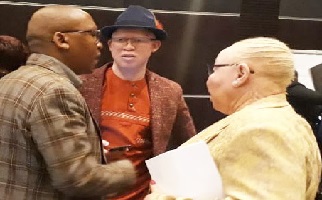Department of Health 2019/09/26 - 22:00

Phumelele Khumalo
Following campaigns in various parts of the province throughout the month of September, Gauteng MEC for Health, Dr Bandile Masuku today officially opened the Albinism Awareness Summit in Kempton Park, Ekurhuleni.
Under the theme, Still standing Strong, Albinism Awareness month, is commemorated annually in September to recognize, celebrate and encourage strength in persons with albinism.
The summit attended by various stakeholders including organisations of people living with albinism, traditional healers, education, social services as well as health professionals aims to generate a solution driven provincial strategy to deal with all challenges affecting the care of people living with this skin condition.
Albinism is a relatively rare condition that is characterized by total or partial lack of the pigment melanin in the skin, hair and eyes. The condition is non-contagious and do affect all races, all ethnic groups and both genders.
Masilo Tampe from Albinism Renaissance Forum said there are a variety of complications that may result from albinism such as: sun burn; skin cancers, especially squamous cell carcinoma; photophobia (sensitivity to light); astigmatism (inability for the eye to focus); nystagmus (involuntary rapid eye movements); strabismus (crossed eyes); impaired vision (low vision) as well as blindness.
Other conditions that could be associated with albinism are: low self-esteem; depression; including childhood depression as well as suicidal ideation and even suicide.
"Prevention of some of the complications include: usage of sunscreen; special sunglasses; corrective lenses as well as protective clothing,"
"We urge the Health MEC to ensure that these services are made available at all public health facilities so that people living with albinism do not travel long distances to access medical health care," pleaded Tampe.
Addressing the delegates, Gauteng Health MEC, Dr Bandile Masuku said albinism has no cure, but services are available in the facilities for the prevention of most of the complications and conditions associated with the disorder.
"We also provide genetic counselling services; sunscreen and sun protective clothing; corrective lens, glasses and contact lenses; mental health services for those who have low self-esteem; depression and suicidal ideation," said MEC Masuku.
MEC Masuku encouraged the delegates to talk freely during the discussions and promised to take all their recommendations to account when drafting a strategy for the province.
"Through this summit we would like to get opinions and input on how to address stigma, myths and discrimination, as well as determining the best possible ways to deliver services at our health facilities that meet your needs,"
"By the end of the summit we would like to develop a strategic framework to render and monitor health services for people with Albinism that will protect and promote the fundamental rights of persons with Albinism," he concluded.
The different commissions are as follows: Mother and Child health (Genetics, Mental Health and Social Services); School Health and Youth Friendly Services; Clinical Services (Eye Health Services, Vocational Rehabilitation, Pharmaceutical, Dermatology) as well as Stigmatization and Myths (Traditional Healers, HIV/AIDS).
RELATED NEWS
No related news

